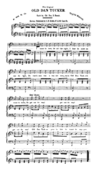| "Old Dan Tucker", also known as "Ole Dan Tucker", "Dan Tucker", and other variants, is a popular American song. Its origins remain obscure; the tune may have come from oral tradition, and the words may have been written by songwriter and performer Dan Emmett. The blackface troupe the Virginia Minstrels popularized "Old Dan Tucker" in 1843, and it quickly became a minstrel hit, behind only "Miss Lucy Long" and "Mary Blane" in popularity during the antebellum period. "Old Dan Tucker" entered the folk vernacular around the same time. Today it is a bluegrass and country music standard. It is no. 390 in the Roud Folk Song Index.
The first sheet music edition of "Old Dan Tucker", published in 1843, is a song of boasts and nonsense in the vein of previous minstrel hits such as "Jump Jim Crow" and "Gumbo Chaff". In exaggerated Black Vernacular English, the lyrics tell of Dan Tucker's exploits in a strange town, where he fights, gets drunk, overeats, and breaks other social taboos. Minstrel troupes freely added and removed verses, and folk singers have since added hundreds more. Parodies and political versions are also known. The song falls into the idiom of previous minstrel music, relying on rhythm and text declamation as its primary motivation. Its melody is simple and the harmony little developed. Nevertheless, contemporary critics found the song more pleasant than previous minstrel fare. Musicologist Dale Cockrell argues that the song represents a transition between early minstrel music and the more European-style songs of minstrelsy's later years. Lyricsedit "Old Dan Tucker" as originally published exemplifies the masculine boasting songs that predominated in early minstrelsy. Modern analysts emphasize the song's rawness, racism, and disdain for social taboos. In ersatz Black Vernacular English, the song uses short, active words such as runnin and cryin, to portray Dan Tucker as a rough-and-ready black man in the mold of Jim Crow, Gumbo Chaff, and ultimately the tall tale frontiersman: (more...) |
